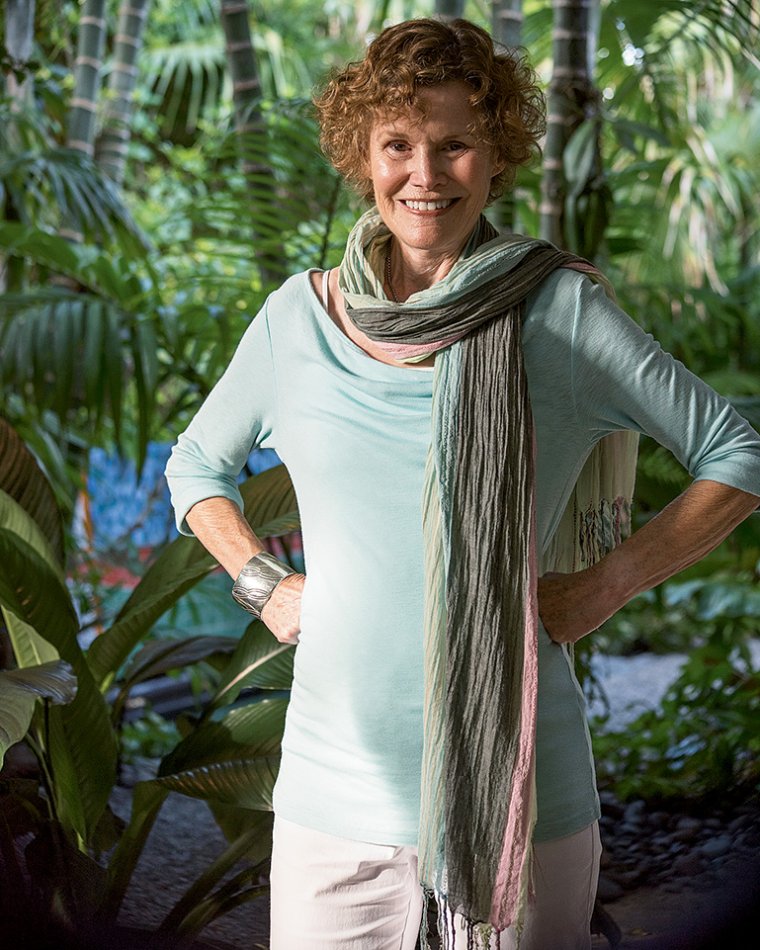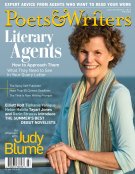Last year, as the deadline for the delivery of the manuscript of In the Unlikely Event began to loom, two issues—both related to language and storytelling, as it happened—presented themselves as potential roadblocks in the publication schedule.

One was that after having written the first of the novel’s four parts, Blume took two years off from the project to work on the film adaptation of her novel Tiger Eyes (Bradbury, 1981), directed by her son, Lawrence Blume. (As a published author, she chose to retain the surname of her first husband, John M. Blume, an attorney. They divorced in 1976, after which she married a physicist, Thomas Kitchens. They divorced after two years, and she married Cooper in 1987. “I’ve been with George for thirty-five happy years,” she says with a smile, “to make up for everything else.”) When Blume returned to work on In the Unlikely Event, she came to see Part One as too slowly paced and too crowded with characters. “I kept telling Carole, ‘I want to speed it up!’ You know you’re in danger of damaging your book when you want to take out big chunks of it and throw them away. And Carole would say, ‘Put that back!’”
As Baron recalls, “My feeling was that when we experienced the horror of the first airplane crash, we should know who the people were.” She got her way.
The second issue was that the newspaper articles about the airplane crashes, attributed in the book to Henry Ammerman, were largely based on actual accounts that originally appeared in two local newspapers, the Elizabeth Daily Journal and the Newark Evening News, both now defunct. It didn’t feel right to publish the real-life newspaper stories verbatim under Henry Ammerman’s fictional byline, but with her deadline approaching, Blume despaired of finding enough time to rewrite the stories.
At that point, Cooper entered the fray. “I’ll be your Henry Ammerman,” he said. Under Blume’s supervision in the role of a tough “city editor,” as he put it, Cooper got to work, recrafting the newspaper articles, retaining and sometimes putting his own spin on their hyperventilating prose style. “I took all the stories and added some flourishes of my own,” he says now. “I tried to tailor them to the fictional narrative, building on the story that was building in the fiction.”
“I would have said the exact opposite,” Blume says. “The news stories gave me the structure for my narrative.”
![]()
During the writing of Summer Sisters, Blume, who then lived in New York City, frequently talked about her love of summer, so Cooper said to her, “You could have more summer in your life if we went someplace in winter.” “Great,” she said, “let’s try to rent a place somewhere for a month.” They rented a place in Key West, fell in love with the island, and returned again and again, eventually making it their home in 1997.
“You live a regular life here,” the author says during a contented walk on the beach at sunset, “and you forget how lucky you are until someone reminds you.”
The self-styled Conch Republic has been good to Blume, and not only because of its nearly endless summer. For decades the island has nurtured a community of poets and writers, including Ernest Hemingway, Tennessee Williams, Robert Frost, Elizabeth Bishop, John Hersey, James Merrill, and Shel Silverstein, a context in which Blume fits like bougainvillea on a breezy Old Town veranda. And from her twin perches as a best-selling author and a board member of the Literary Seminar, she has been well positioned to mentor many young writers whose work she admires, providing advice and much-needed advocacy at some of the most crucial stages of their careers.
“I wanted to be a writer because of Judy Blume and her books,” says Carolyn Mackler, who first met the author while interviewing her in Key West for an article in Ms. Magazine. “She was my hero, and she was very welcoming and generous and kind to me on that visit. I was twenty-four, and during the interview, I mentioned that I wanted to write novels like hers. She said, ‘When you get a draft that you feel comfortable with, call me and we’ll talk.’ She really ended up guiding me through writing and publishing my first novel, Love and Other Four-Letter Words [Delacorte, 2000]. She read an advance copy and gave it a wonderful book-jacket quote. She’s been a mentor to me for seventeen years.”
Something similar happened to Madonia, whose short story, “Cheap Red Meat,” won the first Key West Literary Seminar Fiction Contest, in 2008—largely because, unbeknownst to the young writer, Blume had come across the story in the contest slush pile and fallen in love with it.
“I got down there and was waiting in line to have my book signed by Judy Blume,” Madonia recalls. “She saw my name tag and said, ‘It’s you!’ She loved what she saw in that short story, and really fostered my career from that moment. Half an hour later we were exchanging numbers and making plans to have breakfast. You know, you meet her and forget that you’re talking to someone unbelievably famous. And whenever I’ve hesitated in my career or had doubts, she’s always been the one I reach out to. She always says, ‘Go write another book. That’s who you are.’”
![]()
After decades of feeling reborn every morning at her writing desk, Blume herself has reached a point in her life when she’s not sure whether she’ll write another book. And if she does do so, she insists that it won’t be another lengthy, scrupulously researched tome like In the Unlikely Event, which arrives in bookstores at a muscular 416 pages.
“I’m seventy-seven years old and I don’t want to write another long novel,” she says. “I don’t want to spend three to five years doing that. I’m not saying that I’m never going to do anything, because I have a lot of creative energy.”
Baron isn’t buying it, at least not entirely. “I think the thing about this new book that’s different from her other novels is that there’s a basis of fact in dealing with these airplane crashes,” she says. “Judy is so thorough about her research, so adamant about getting every single fact right, that it added a layer to her editorial process that I don’t think she’s ever experienced before. So, sure, I believe she’s not going to undertake another book that has such a basis in nonfiction. But Judy is a storyteller, and storytellers are always telling stories. She said the same thing to me about this maybe being her last novel, and I said to her, ‘When you’re ready, I have an idea.’”
Who knows? Thanks in part to the comfortable climate and her long walks around Key West every morning with Cooper, the author appears significantly younger and more energetic than her actual age might suggest. But as always, Judy Blume is a pragmatist who understands her limitations. After many happy years in their gorgeously landscaped, high-modernist home in Old Town, Blume and Cooper are making plans to sell the house and downsize to a much smaller condo on the nearby beach. The heavy spadework of In the Unlikely Event—the digging up of what had been buried for so long—has been done. An assignment has been completed, a burden lifted.
Standing on a Key West pier taking in yet another gorgeous sunset, Blume heaves an unmistakable sigh of relief. “If this is my last book, then I’m really happy about it,” she says. “I feel I was meant to tell this story, and now I’ve told it.”
Kevin Nance is a contributing editor of Poets & Writers Magazine. Follow him on Twitter, @KevinNance1.









